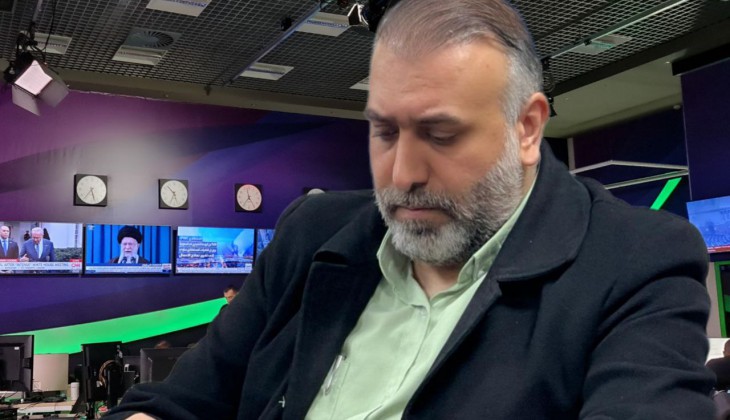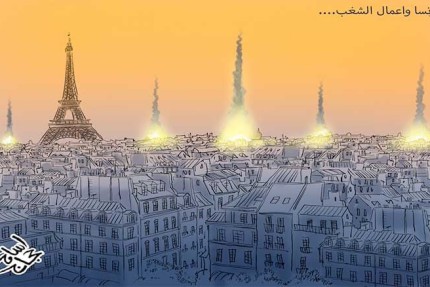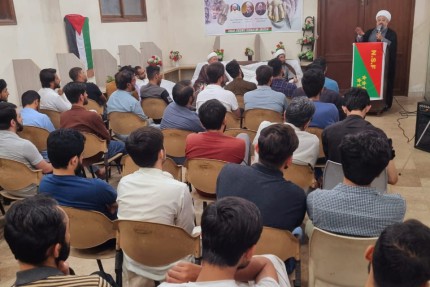Editor’s note
The world of the future is the world of nuclear warhead discourse

As the world approaches the brink of catastrophic conflict, the shadow of nuclear war casts a long and sinister shadow on global security.
As tensions have escalated in many geopolitical hotspots, rhetoric around nuclear weapons and their potential use has intensified alarmingly, and that concern is more alarming given that some reckless nuclear players such as the Zionist regime have threatened to use them against the besieged people of Gaza.
Noam Chomsky, the famous American researcher, draws a dark picture of the future of humanity against this turbulent background, in which the dark landscape of climate crises is intertwined with the imminent threat of nuclear proliferation. Chomsky’s ideas come at a time when the global community has witnessed the erosion of the doctrine of Nuclear Non-Proliferation, erosion exacerbated by geopolitical tensions, the expansion of nuclear capabilities and American support for nuclear weapons of authoritarian, occupying and reckless powers such as Israel.
According to Chomsky, the ongoing conflict between Ukraine and Russia, which has now entered its third year, is a reason to exacerbate the real fear of intensifying nuclear threats, as the rhetoric of activating the tactical nuclear weapon option has developed significantly. Referring to the ongoing Ukraine-Russia conflict as a possible ground for the use of nuclear weapons, Chomsky also highlights wider implications, noting that it is not only regional, but also a terrible warning of a possible global catastrophe.
And the story doesn’t end there; it all gets more complicated by the strategic maneuvers of the world’s superpowers. The main actors in the high-stakes drama are the US, Russia and China, who each consider the use of nuclear warheads as a tactical option in future confrontations.
This suggests that these countries see nuclear capability not only as a means of deterrence, but also as a practical strategy for coercion, attack and defense.
After French President Emmanuel Macron repeatedly reiterated his desire to send troops to Ukrainian territory to defend Ukraine against Russia and his efforts to persuade other European countries to participate more actively in the conflict, speculation and expectations are growing about Russia’s readiness to escalate and turn nuclear threats into reality against NATO.
Turning to the South China Sea and the conflict zone with the Dragons of China and Asia, it must be said that the strategic landscape has changed rapidly due to the rapid expansion and diversity of Chinese nuclear forces, which includes a high emphasis on missile defense and capabilities that may change the balance of power in the Indo-Pacific region. According to the developments, fears of a possible conflict between the US and China over Taiwan have strengthened by 2025.
UN Secretary-General Antonio Guterres, deeply aware of the danger of spreading the nuclear conflict, called for immediate denuclearization and dialogue between nuclear-armed countries to prevent a catastrophic incident.
The call to action echoes the moment doomsday clock approaches midnight, symbolizing humanity’s approach to self-destruction due to nuclear hazards and other existential threats. Moreover, the complexity of the nuclear landscape is evident in the evolving roles of other nuclear-armed countries such as France and the United Kingdom and emerging powers in Asia, as each grapples with the strategic implications of nuclear deterrence and the realities of Modern Warfare.
These dynamics highlight the existence of a multipolar nuclear regime, as regional tensions in places such as the Korean Peninsula, the Persian Gulf and around the Taiwan Strait further complicate global stability.
Although this discourse was initially limited to traditional and classical nuclear powers, the implications of a nuclear war could extend and spread far beyond these countries.There is growing concern that other countries, spread across a broad geographical map, may also see nuclear weapons as a means of using force, defensively or as a countermeasure. It paints a terrifying picture of a future in which nuclear warheads can become many tools, not just superpowers.
Regionally, given the Zionist regime’s aggression and limitless crimes, which owns the only and largest nuclear arsenal in the Middle East, Iran constantly expresses the calculated principled and strategic position under the guidance of the Supreme Leader.
Iran reiterates that its nuclear program is entirely for peaceful purposes and complies with moral and religious frameworks dictated by Islamic law. Ayatollah Khamenei has repeatedly stressed that the production of nuclear weapons is not only prohibited on the basis of Shiite Islamic principles, but also contradicts Iran’s strategic interests.
Ayatollah Khamenei’s comments point to a complex self-defense strategy that shows that although Iran does not seek to acquire a nuclear weapon, if faced with nuclear aggression by regional powers or world powers, it is ready to respond with a similar force, in particular it should be remembered that the United States is the only country to have used a nuclear weapon against Japan, and that Israel, the illegitimate and corrupt American Vlad, had threatened to use a nuclear weapon in the October 1973 war against Syria and Egypt.
The implications of this policy are pervasive, and in a world where nuclear capabilities are often addressed through the lens of power dynamics, Iran’s approach challenges conventional models of nuclear deterrence and assumes a scenario where rules of engagement can be defined as necessary and retaliatory rather than preventive weapons. If world powers break the rules of the game, countries like Iran and other world powers will put their options on the table and shape the new world order in different forms. The dangerous point of history for the totalitarian powers is that today the confrontation with it will not be limited to the use of Allied power, other options will be implemented at an amazing speed and the fact that it has become clear to everyone, the coming war, the speech of power and its language, the language of the nuclear warhead.
While the global landscape is on the brink of nuclear escalation, as geopolitical tensions escalate and the spectre of nuclear conflict becomes a serious and potential threat, the world urgently needs to reset its approach to tackling nuclear weapons. The United Nations is calling for immediate disarmament, underscoring the need to develop realistic and practical strategies that address possible proliferation and use of nuclear weapons.
This includes not only diplomatic negotiations, but also the development of a strong framework for implementation capable of adapting to the rapidly changing dynamics of international policy. These measures apply equally to all nuclear powers, including those that do not recognize something called security and world peace, such as Israel and America’s fraudulent and illegitimate regime.
Mohammadali Senobari
Comment
- Behind the Scene of the Attack in Oman, Operating Schemes that Intend to Destabilize the Country
- Trump’s Assassination Was a Ridiculous and Pre-organized Drama
- The Syrian senior analyst Views Towards the Letter of Iran’s President -Elect to the Secretary General of Hezbollah of Lebanon
- The hard way to political agreement in France/ Will Macron remain in power?
- Navigating the Caspian: Energy, Trade, and Geopolitical Harmony
- Behind the Scene of the Attack in Oman, Operating Schemes that Intend to Destabilize the Country
- Trump’s Assassination Was a Ridiculous and Pre-organized Drama
- The Syrian senior analyst Views Towards the Letter of Iran’s President -Elect to the Secretary General of Hezbollah of Lebanon
- The hard way to political agreement in France/ Will Macron remain in power?
- Navigating the Caspian: Energy, Trade, and Geopolitical Harmony
- Holding Public Court in Damascus to Put the Zionist Regime on Trial
- Boycotting Israeli Athletes for the Olympics in France Is Indispensable
- Iraqi Media Activists Arrested in Saudi Arabia/ Using the Hajj pilgrimage for settlement with the opponents
- Syrian Journalist and Author Tabib Ahmad Al-Darzi’s Analysis on Ali Bagheri’s Trip to Syria
- What Does it Mean on the Verge of Collapse and Has Israel Reached This Stage
- We Stand in an Era of Fundamental Changes/the World’s Political Literature is Changing
- The Art of Soft Power: How Khomeini and Khamenei Used Words to Transform the World
- Mey Sobhi Khansa’s views towards the Hague court verdict and the martyrdom of I R Iran president
- Behind the Scene of the Attack in Oman, Operating Schemes that Intend to Destabilize the Country
- Trump’s Assassination Was a Ridiculous and Pre-organized Drama
- The Syrian senior analyst Views Towards the Letter of Iran’s President -Elect to the Secretary General of Hezbollah of Lebanon
- The hard way to political agreement in France/ Will Macron remain in power?
- Navigating the Caspian: Energy, Trade, and Geopolitical Harmony
- Holding Public Court in Damascus to Put the Zionist Regime on Trial
- Boycotting Israeli Athletes for the Olympics in France Is Indispensable
- Iraqi Media Activists Arrested in Saudi Arabia/ Using the Hajj pilgrimage for settlement with the opponents
- Syrian Journalist and Author Tabib Ahmad Al-Darzi’s Analysis on Ali Bagheri’s Trip to Syria
- What Does it Mean on the Verge of Collapse and Has Israel Reached This Stage




